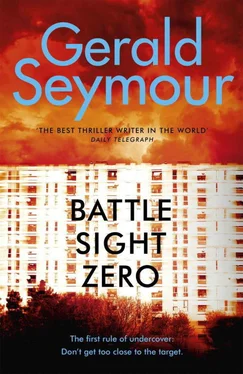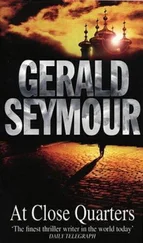She might sleep after Lyon, his destination, if her anger allowed it.
Light reflected off an opening window. A street-light caught the angle of the glass on a first floor and almost opposite, across the street, from the overturned scooter and the two intertwined bodies underneath it.
Pegs saw the moment the light hit.
She had been alongside police professionals all her working life. She was also, irrelevant to a woman of 47 years, a disappointment to her parents who had chucked money at her education – wasted. She had arrived in the secretive offices off Wyvill Road by chance: a ’flu virus rampant and desk staff dropping like sprayed flies. An impression had been made, doors had opened, an offer of extended work had become a posting, and within a year she had moved quietly, discreetly, into both Gough’s office and his life, had turned her back on Hackney, and a civilian job collating burglaries, knifings. The position was not abused and she had become fiercely loyal, would stay with him until he dropped, was axed, or retired. She had perception, wheelbarrow loads of it – what she called ‘simple bloody common sense’ – and was blessed with a good eye.
It was the third window onto which light from the street lamp had bounced.
All the time that the boy under the scooter had yelled increasingly dire threats, she had watched the movements of the officer they called Samson. There had been one in London, as she remembered – right place at the right time, or the opposite – who had notched up more kills than any other. It would be interesting to see his work at close hand, had no doubt in her mind that was how it would end. The man had eased down the street and had kept his rifle against his leg so that it would not be obvious, had tried shop doors and found them locked but then had come to a darkened alley between two buildings, barely wide enough for his shoulders, and had disappeared into it. She had seen the first window nudged open, then closed and presumed the alignment could be bettered, and then the second window. The third had opened, left ajar.
Because of her good vision – Gough would not have noticed it and she had not yet alerted him – Pegs had seen the protruding tip of a rifle barrel.
The wound on the leg, where the broken bone had split the skin, would have hurt as bad as Pegs could imagine. She had been through childbirth once, had not enjoyed it nor thought the end product worth the effort, and she had suffered a broken nose – straightened skilfully in Casualty – when mugged in east London, but had not known the sort of pain the kid suffered. He would be irrational, unpredictable, and several times she saw the pistol jerked so hard into the hostage’s neck that the head was tripped sideways… it would be a matter of judgement. She liked that, the thought of a decision being taken. Where she worked, a pace behind her mentor, Gough, decisions had to be made on the hoof, not with a committee to refer back to… A decision would be made here, perhaps already had been. Time to stir Gough? Probably. Away to her right, she could see the Major intent and listening on his phone. She nudged Gough. She did not point, did nothing to attract attention, just spoke quietly in Gough’s ear and he nodded when he’d seen the rifle at the slightly opened window.
Gough said, a whisper, ‘You wouldn’t envy him. The bad boy shoots first, and who cares about him being taken down a second later. The operation fails. The marksman shoots and the bullet does the necessary damage to the bad boy and then hits a hunk of bone and is diverted into the good boy’s upper chest. It fails. He cannot be told what is the right time has to make his own judgement, is alone… I am thinking, Pegs, of our own man, and we don’t share the weight of his burden, cannot: he is equally alone.’
There was another shout, and the voice was hoarse, like it came from deep in the throat, way into the chest, and the pain must have climbed. She told Gough that it seemed like an end-game. That he’d shoot his prisoner and it would be the same as a suicide. No overdose and no rope slung over a garage roof beam, but a cop doing the job.
‘It has to be now,’ Pegs said. Has to be…’
The shot, breaking the screaming insults of the bad boy, cut her off. The report made less noise than she’d have imagined. She looked, not at the target, but at the window. The barrel tip was motionless and protruded no more than a foot from the sill. No emotion, no stress.
And the hit? Hard to tell. The scooter had shifted, was lifted higher. Pegs saw what should have been the head of the target but only half of it and was confused and her hand came up to her mouth. The second head, which had been underneath, was clear to her, and blood spattered, laced with brain tissue. She felt the vomit rising in her throat. She was supposed to be the hard woman, no tears and no fuss, and no visits to the shrinks – and the sight of an agent pulled from a canal, too young and too fresh and too eager to survive, but shoved into harm’s way because it had seemed important, had not turned her stomach. There was a violent motion and one body was pushed and then heaved and it flopped aside.
It had been, she assessed, a dramatically good shot. With the rise of the vomit was a great gasp in her throat. She swallowed. Death handed down. Quick and clinical, like an executioner would have done it. One down and one standing. She did not know his name, his significance if any. A feeble young guy and blood loose on his face, and his clothing messed with it. The street was silent, the shouting over.
He moved like a rat. A satchel bounced on his hip. He was bent low, squirming, and had his hands on the scooter and pulled it up. It was a cheap scooter, an old one, what a teenager would have owned while dreaming of something better, faster, something with style. He had been prone on the tarmac for a long time, had moved hardly at all, had had the weight of the other boy on top of him, and the scooter’s, and now he went fast – and had had a pistol pushed against his neck. Showed no sign of an ordeal – Pegs thought him a street fighter, and marvelled.
The scooter was upright. A leg went over the saddle bar. The key was still in the ignition slot. A twist of it, a wrench on the handle. And again, and… The engine coughed, spat out fumes. A body with only half a head was left behind. The scooter charged the police line and the satchel was thrown back to the extent of the strap, like hair in the wind… How should it have been? Should have been police with guns going forward and waving the medics to follow them, and then a priest, and afterwards the whole paraphernalia of care consuming the boy who had been a hostage and close to death and unable to intervene for his own life. The boy should have been wrapped in blankets or in tin foil as if he were a disaster victim and in shock and nurses close and a doctor working on him.
He drove towards the police line and guns were raised but not fired. An opening appeared – a Red Sea moment. He was not stopped and was accelerating into the gap. She supposed a juvenile rat would have fled as fast if it had been freed from the claws of a household cat. The scooter engine was not tuned and the carburettor was in need of cleaning out, and its noise was raucous. It disappeared from her sight. Not like anything she had experienced. All that was left in the street were a pair of feet in trainers and they stuck out under a strip of canvas that now covered the body. The police protected the immediate scene but the road was opening and the first cars were coming through slowly. She knew her motorcycles, they’d been her former husband’s delight and fantasy, and when she had tried to please – not often – she had brought home a magazine for fanatics. The rumble of sound was from a Ducati Monster with a helmeted rider who had his visor down.
Читать дальше












